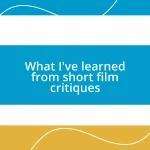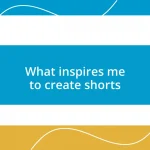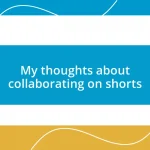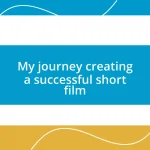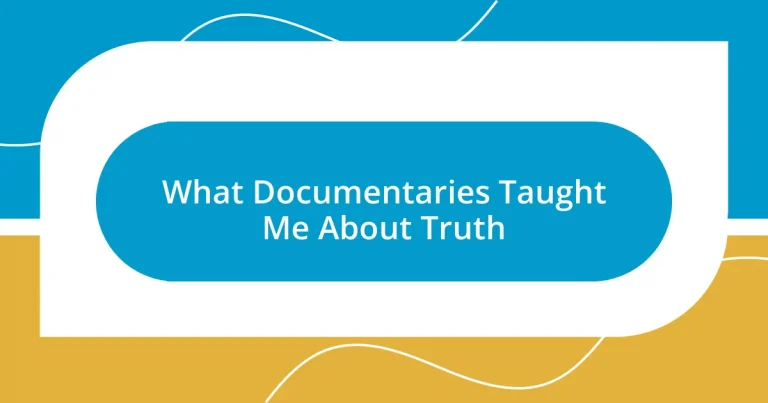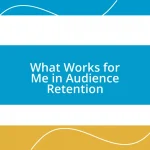Key takeaways:
- Documentaries challenge viewers to confront complex truths and feelings, often reshaping their understanding of societal issues, as seen in films like “13th” and “The Act of Killing.”
- Emotional storytelling in documentaries fosters empathy and connection, encouraging reflection on personal beliefs and societal responsibilities, exemplified by “Won’t You Be My Neighbor?” and “Blackfish.”
- Engagement with documentary narratives prompts personal introspection and motivation for change, illustrated by the viewer’s self-reflection after watching “The Social Dilemma” and “Icarus.”
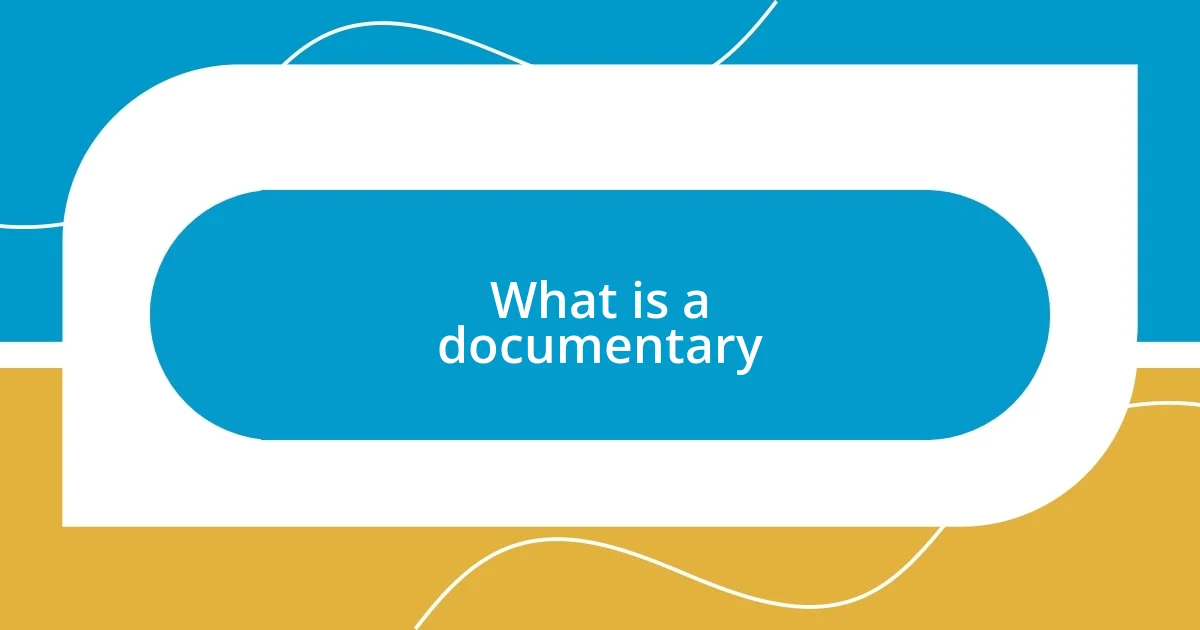
What is a documentary
Documentaries, at their core, are non-fiction films or television programs that aim to document reality. They often delve into real-life events, people, and societal issues, offering viewers a window into different perspectives. Have you ever found yourself captivated by a story that felt both profound and unsettling? That’s the magic of documentaries—they not only inform but also evoke emotions.
I remember watching “13th” and being struck by how the film blended historical facts with personal stories. It was a powerful reminder of how documentaries can challenge our understanding of complex issues, urging us to rethink our preconceived notions. How do we discern truth from the narratives presented to us? That’s a question documentaries often provoke.
Many people might view documentaries as mere educational tools, but I’ve experienced them as emotional journeys. They weave together interviews, archival footage, and compelling narration, creating an immersive experience that resonates on a deeper level. In my view, a great documentary not only tells a story—it compels us to feel, reflect, and ultimately seek our own truths in the world around us.
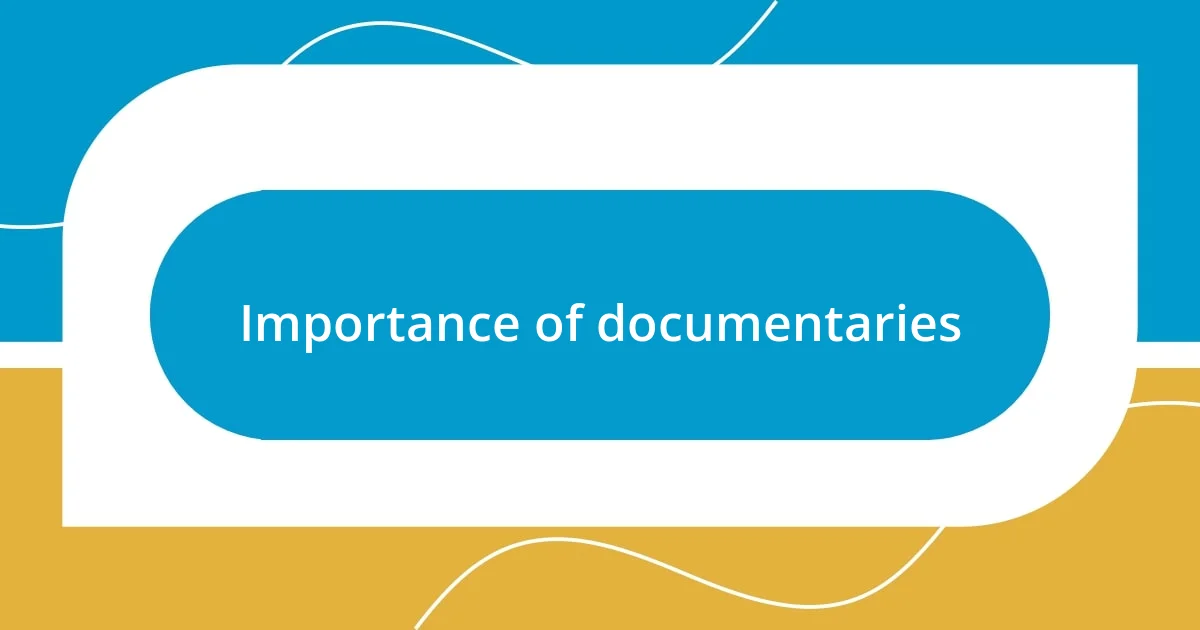
Importance of documentaries
Documentaries hold immense value in today’s fast-paced, information-saturated world. They encourage us to pause and reflect on our surroundings and experiences. I recall watching “The Act of Killing” and being both fascinated and disturbed by the portrayal of historical events and how they get reshaped through personal narratives. This unique approach not only uncovers truth but makes us grapple with the emotional weight of history.
Through documentary storytelling, we’re exposed to multiple sides of a truth, which is crucial in our increasingly polarized society. One moment that stands out to me was when I viewed “Won’t You Be My Neighbor?” It illuminated the profound impact of Fred Rogers’ kindness and empathy. This documentary reminded me that there’s often more to a story than what meets the eye, inviting us to explore deeper emotional truths.
I believe documentaries have the power to bridge the gap between information and personal connection. In my experience, witnessing stories of everyday heroes or social struggles connects me to broader human experiences. They make complex subjects approachable, inspiring us to engage with the world in a more meaningful way. For instance, after watching “The Social Dilemma,” I found myself reflecting on my own media habits, showcasing how documentaries can truly inspire change in our perspectives.
| Type of Importance | Description |
|---|---|
| Awareness | Documentaries raise awareness of pressing societal issues, often highlighting narratives we might overlook in mainstream media. |
| Emotional Impact | They evoke emotions and foster empathy, making the viewer feel connected to the subjects portrayed. |
| Critical Thinking | Documentaries encourage us to question established narratives, pushing us to delve deeper into understanding complex truths. |
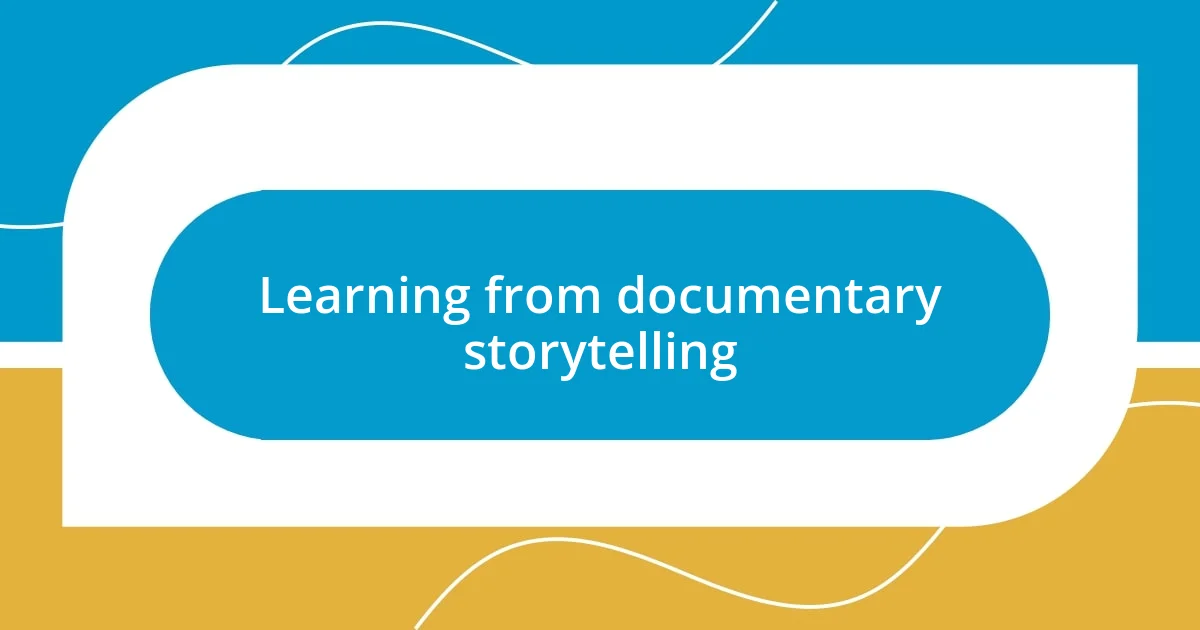
Learning from documentary storytelling
Documentary storytelling has this incredible ability to not only share facts but also to immerse us in emotional experiences that often challenge our perspectives. I vividly remember watching “My Octopus Teacher,” where the filmmaker’s relationship with an octopus stirred deep reflections about connection and nature. It struck me how a seemingly simple story could highlight the intricacies of life and provoke a sense of wonder while deepening my appreciation for the world around me.
What I find fascinating about documentaries is their power to ignite curiosity. They present complex subjects in relatable ways, compelling us to explore further. Whenever I watch a documentary, it often sparks a desire to learn more. Here are some essential insights I’ve gathered from my experiences with documentary storytelling:
- Narrative Depth: Documentaries often weave personal stories with historical context, enriching our understanding of complex issues.
- Visceral Experience: They create a shared emotional journey, making us feel the weight of the stories being told.
- Encouraging Reflection: Documentaries invite us to reconsider our beliefs by presenting alternative viewpoints, fostering critical dialogue in the process.
These elements resonate with me and remind me why I keep seeking out documentaries—they transform the way I see and engage with the world.
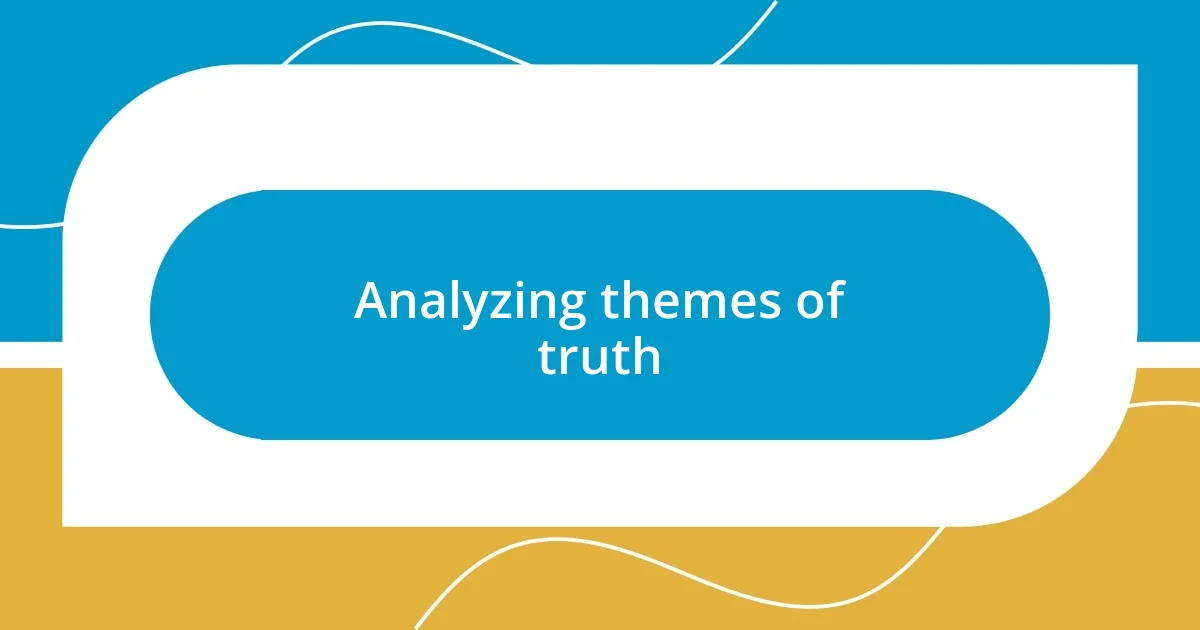
Analyzing themes of truth
When analyzing themes of truth in documentaries, I often find myself questioning the very fabric of the narratives presented. For instance, after watching “13th,” I was struck by how the historical accuracy of what I thought I knew about the prison system was challenged. It made me realize that truth isn’t just about facts; it’s also about perspective and the powerful stories that shape our understanding of them.
Another layer that fascinates me is the emotional connection these films create. I remember feeling a wave of emotions while watching “The Fog of War,” where Robert S. McNamara shares his experiences during pivotal moments in history. His reflections on war strategies and human errors highlight the often murky waters of moral decision-making. This got me thinking: How can we reconcile the hard truths of history with the emotions they evoke? It’s a delicate balance that documentaries navigate beautifully.
As I dive deeper into these films, I recognize that uncovering truth is rarely straightforward. “The Act of Killing” exemplified this complexity by allowing perpetrators to reenact their crimes. The disturbing reenactments forced me to confront the uncomfortable reality that truth can be manipulated, even by those living it. This leaves me pondering—how often do we accept narratives at face value without considering the underlying motives? Engaging with these thoughts transforms my viewing experience into a reflective journey, one where every documentary offers a new lens through which to explore the truth.
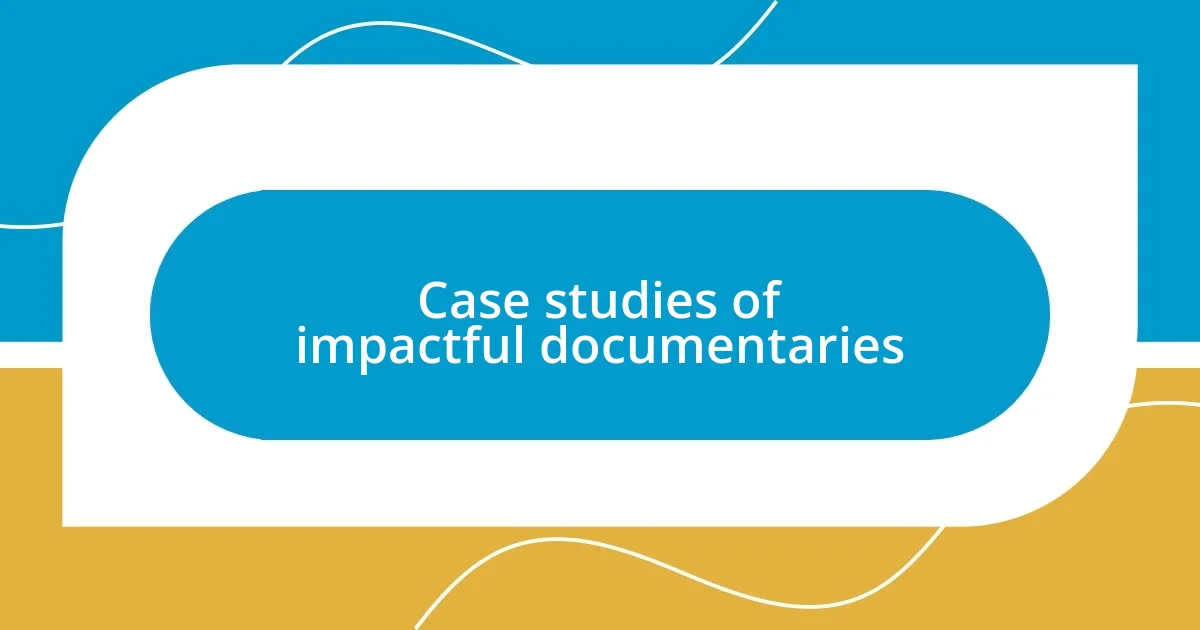
Case studies of impactful documentaries
One documentary that profoundly impacted my perspective is “Won’t You Be My Neighbor?” This film about Fred Rogers intertwined his compassionate philosophy with the realities of childhood development and social issues. I found myself reflecting on how kindness can shape our interactions with others. It made me ponder: what if we all approached our relationships with that level of care?
Another striking example is “Jiro Dreams of Sushi.” The meticulous dedication of Jiro Ono to his craft challenged my views on mastery and success. Watching him work, I felt inspired to think about my own pursuits. How often do we commit ourselves fully to our passions? This documentary reminded me that relentless pursuit of excellence can yield profound fulfillment, rich lessons that extend beyond the culinary arts.
“Blackfish” stands as a reminder of how powerful storytelling can evoke change. The film’s emotional narrative around captive orcas pushed me to reconsider our relationship with nature. I was left grappling with the ethics of animal captivity. This documentary doesn’t just tell a story; it ignites a conversation about humanity’s responsibility toward other living beings. Have I been complicit in systems that harm those who cannot speak for themselves? It’s a question that lingers long after the credits roll.
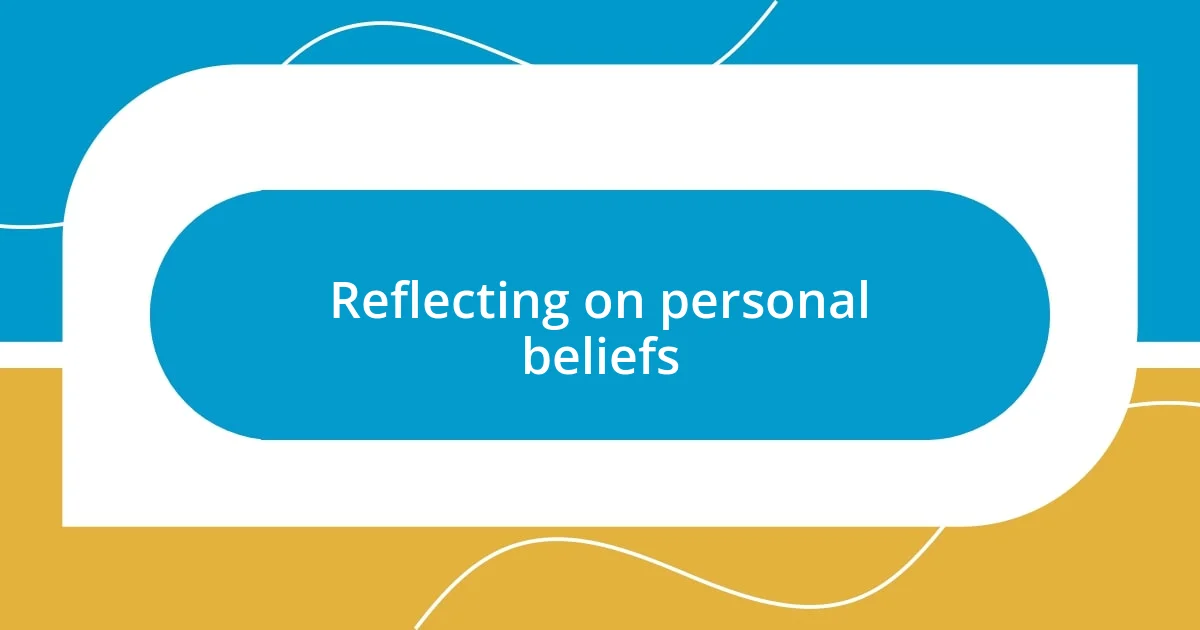
Reflecting on personal beliefs
Reflecting on my personal beliefs often leads me down a path of introspection that can be quite unsettling. I remember watching “The Social Dilemma” and feeling that familiar unease creep in as I confronted how social media shapes not just our perceptions but our very identities. It made me ask myself: Am I curating my life for validation, or am I engaging authentically? Such questions force me to reassess the motivations behind my online habits and filter my beliefs through a more critical lens.
Another experience that stands out is with “Won’t You Be My Neighbor?” The way Fred Rogers approached compassion truly challenged my views on empathy and social responsibility. As I watched, I was struck by his genuine kindness—a trait I strive to emulate in my everyday interactions. It made me wonder: How can we infuse more of that kindness into our daily lives, especially in a world that often feels harsh? This reflection nudged me to consider how my own actions impact those around me and the importance of being a source of positivity.
When I think back to “Jiro Dreams of Sushi,” it pushed me to reflect on my own work ethics and aspirations. Jiro’s relentless pursuit of perfection sparked a flame in me, urging me to ask: Am I truly passionate about what I do, or am I simply going through the motions? This realization illuminated the distinction between chasing success and nurturing a deep-seated love for my craft. It’s a reminder that aligning my work with my core values is essential for finding fulfillment and meaning in my endeavors.
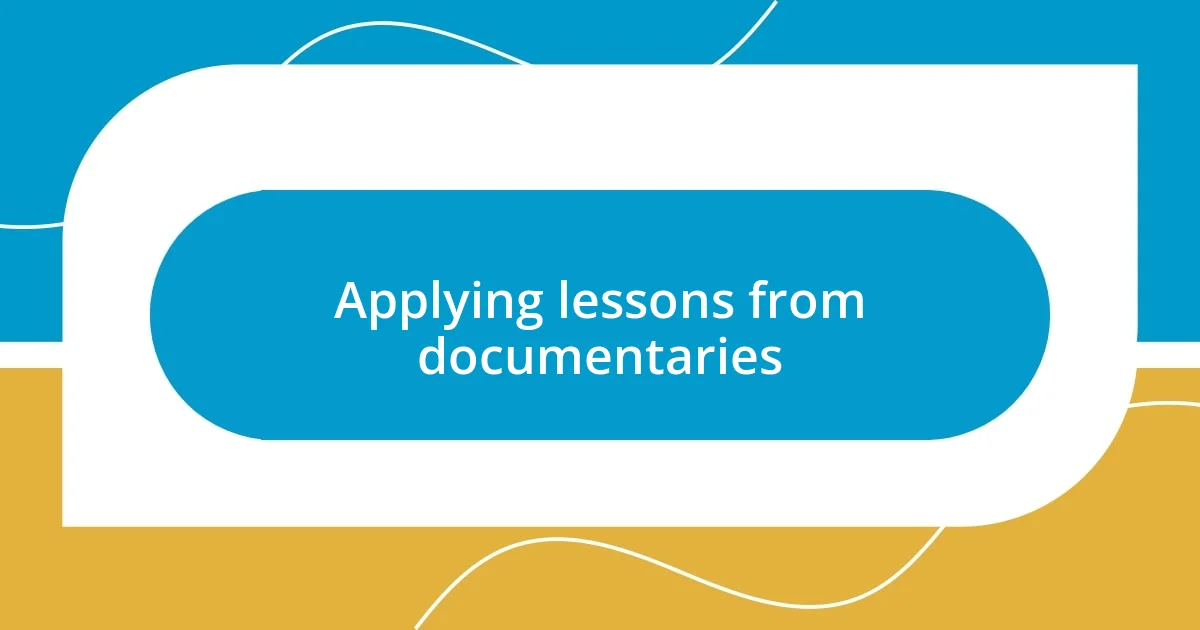
Applying lessons from documentaries
Applying lessons from documentaries often leads to profound personal change. For instance, after watching “13th,” I felt a sense of urgency regarding social justice. It prompted me to take a closer look at my own beliefs about race and the criminal justice system. Questions like, “What can I do to be an ally?” lingered in my mind, steering me to engage more actively in conversations about systemic racism and advocacy.
When I reflected on “The Act of Killing,” the sheer horror of the events depicted haunted me. It forced me to confront the uncomfortable truth about human nature and violence. I found myself wondering, “Could I confront my own past mistakes with the same honesty?” This realization encouraged me to face my shortcomings head-on, reminding me that truth and reconciliation require courage—even when the truths aren’t pretty.
Then came “Icarus,” which unveiled the complexities of truth in the world of sports. Watching the unraveling of the doping scandal stirred a mix of disbelief and fascination within me. It made me question: “How often do we overlook the ethical lines we cross in pursuit of success?” This reflection pushed me to evaluate my own areas of life where ambition might cloud my moral judgment, igniting a deeper commitment to integrity in both personal and professional realms.


